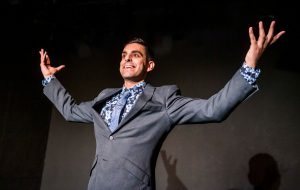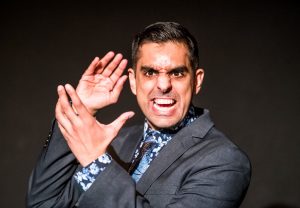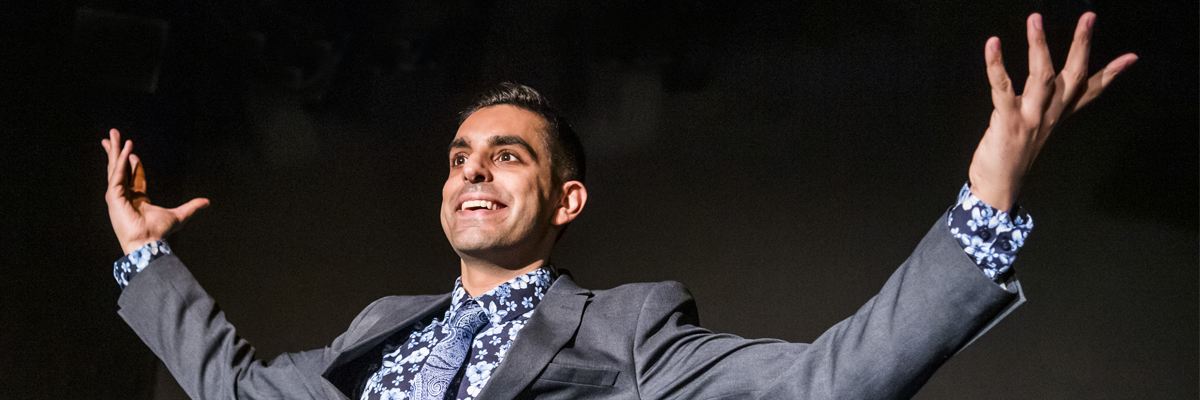Osman Baig (TV Current Affairs Journalism, 2008) recently performed his one-man play Fake News at the Bridge Theatre in London. As a journalist, he wants to challenge and discuss the perceptions many have about the media and journalists, and tell the truth the way he sees it.
 It’s only a few days after Osman Baig performed his play Fake News at the Bridge Theatre, and he’s delighted.
It’s only a few days after Osman Baig performed his play Fake News at the Bridge Theatre, and he’s delighted.
“It was great. I think audiences are just really glad to be back in the theatre. I was really glad to be back in the theatre. And it felt very special to share that with the audiences.”
The Bridge Theatre is a relatively new space by the Thames and hosts some of the most talked-about plays and performers every year.
“I’d never performed to a crowd of 750 people a night, so that was quite new for me. But it sort of made it easier because wherever you turned in the auditorium, there was that positive energy, and that love and support. I’m so glad theatre is back as we’re turning a corner on this terrible pandemic.”
Fake News was first performed at the Edinburgh Fringe to positive reviews. Having worked as a journalist since he graduated from City in 2008, Osman knew he had a story he wanted to tell.
“We live in this world where increasingly everybody seems to have an opinion on the media. And whether you look at social media or you’re speaking to family and friends, everyone sort of has a negative view about the mainstream media and what sort of strings they think it’s pulling or what control they think it has on society.”
According to Osman, it’s not that straightforward.
“First of all, this show asks what is the media? Is it one homogenous entity that is ruling all of our lives? Do you include things like social media? Is that part of this problem? Do you include the internet? Do you include the arts for doing it in a theatrical format?”
With the play, Osman hopes to shine a light on misconceptions, or at the very least start a conversation.
“I think there is this misconception that the media is this slick machine with these faceless individuals in white ivory towers and suits who are flush with money. And it’s the elite who are in control and in cahoots with politicians, and they’re pulling all the strings trying to control agendas in society.”
Osman’s personal experience of working in the media, even as an intern still studying at City, showed him a different side.
“When I started in the media I was working for big organisations, and I was being given huge responsibilities. Because as we know, the resources are being cut back increasingly in newsrooms at exactly the same time as there is more news than ever, and more competition than ever because mainstream broadcasters and newspapers are now having to compete with anybody really on Facebook or Twitter, or whatever.”
In Osman’s view, the stereotypes are incorrect and unfair.
“What I want to show with this play is that, really, we are just as human as everyone else. We try our best and there are checks and balances. We are not this sort of alien kind of species or otherworldly entity.”
The play is set in a big newsroom where Osman plays all the characters. His protagonist is new at the company and wants to impress his boss and fellow journalists. His ambitions threaten to be his ruin.
“He ends up on his own overnight running the whole website and he stumbled upon this story that has sort of been sitting around and it is a huge story. And he’s like, you know what, I’m just going to click publish.”
Unfortunately, his actions have unwanted consequences.
“The problem is, it [the story] was completely wrong and false, and the play explores what happens and how the main character redeems himself after publicly putting his name to something that is completely untrue.”
 Osman graduated with a law degree before deciding journalism would suit him better.
Osman graduated with a law degree before deciding journalism would suit him better.
“I was always interested in the people behind what would make up the law, and I thought journalism is a really exciting way to explore those stories in real life and it also uses media law.”
City’s course in broadcast journalism gave Osman the start he needed.
“I had a really great time there. It goes in a rush. It is hard work. You’re basically working nonstop. And before you know it, it’s over and you’re like well, where should you go?”
However, Osman still felt he could go a step further in his storytelling and did a postgraduate degree in acting.
“I love the sense of getting to know the characters more intimately and expressing emotion, which you shouldn’t do as a journalist, but you obviously should do as an actor. And that’s why I moved into drama and that form of storytelling where you can wear the mask of a character, but you’re still trapped, telling very human and truthful emotions and sharing those with people in a very visceral way.”
Osman has recently been adapting his play into a screenplay and is hoping to one day see his story on the big screen.
“That way I can connect with more audiences and people who can’t necessarily always get to a theatre or maybe not be living in cities where there is a big theatre culture.”
The theatre and film industry can be notoriously difficult to break into. Asked what challenges he has faced Osman reflects on the changes that still have to happen.
“I think being seen is the hardest thing. Viola Davis said the only thing that often separates people of colour from other people is just opportunity. And this is where I think there are real barriers still because I think the entertainment industry is scared of new ideas.”
Although some aspects of the industry are improving, it hasn’t gone far enough.
“Having actors of colour basically play white posh parts, as written by white posh people, is not enough. We need to get diversity in the writing room and in the production process. And I mean diversity of ideas as well, not just in terms of race, but in terms of gender, in terms of class, in terms of representation of people from all of society.”
And everyone should have to freedom to write the things they feel passionate about.
“You can be brown and not tell a story about being brown but tell a story about something like the news, and that’s still valid.”
Osman still freelances as a journalist and balancing both types of storytelling demands good time management but also self-compassion. According to Osman, not giving up is his biggest success.
“Perseverance is probably the thing I’m most proud of. There’s a lot of uncertainty, I’m speaking to you now and I have no idea what’s going to happen with this show. Maybe nothing will happen? Maybe tomorrow I will get a call from someone saying hey, we watched you at the Bridge and we are interested? You never know, but I think as long as you persevere then at least you know in yourself that you’re ready.”
Asked to give some advice to future playwrights he remembers something he was once told.
“You’ve got to remember that while there are elements of purpose and belonging, and meaning you can attach to this, ultimately, this is a job, and you are here to serve people. So, the story you are telling is to help elucidate an issue that you feel passionate about and to help explore that with people on an artistic level. You are serving people with the job that you do.”
A big thank you to Osman Baig for telling us his story, on and off the stage.
